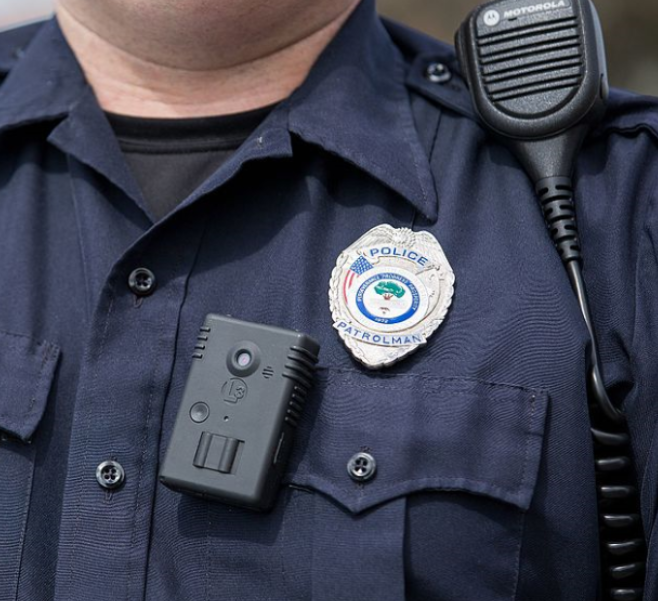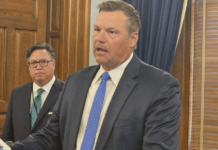A recent recommendation from the Kansas Judicial Council is a serious setback to opening up footage from police body cameras, open-records advocates say.
The council, made up of judges, lawyers and legislators, recommended against passing bills requiring law enforcement to make the footage public.
The panel opposed two bills considered last year that would have required law enforcement agencies to disclose an audio or video recording if a police officer discharged their firearm or used force resulting in a serious injury or death.
The House version of that bill would have required footage be made available upon request within five business days. The Senate bill would have required disclosure within 30 days of the request. The Judicial Council thought the time frame in both bills was too short.
Last year, the Legislature ultimately passed a bill requiring disclosure to families, but not to the general public.
The Judicial Council recommended against making the footage available to the general public after deliberating on the matter four times last year.
It adopted the recommendations of its Criminal Law Advisory Committee, which concluded that the bills “would establish rigid requirements for disclosure and nondisclosure without allowing for a review based on the unique facts and circumstances of each case.”
Instead, the council is urging the Legislature to adopt a “public interest” standard that would be applied not just to body camera footage but to all criminal investigative records.
“The committee acknowledges the importance of the public’s right to review government records and evaluate governmental performance,” the panel wrote.
“However, the public’s rights must be balanced against the need to protect the integrity of criminal investigations and people’s right to privacy.”
The council wants the balancing test written into law for deciding whether investigative records — including body camera footage — would be made available to the public.
It recommended defining “public interest,” in part, as something that would allow the public to evaluate government performance.
The “public interest” would be weighed against several factors, including harm caused by interfering with an investigation, making public the identity of a confidential source or undercover agent, revealing investigative techniques, or endangering someone’s life.
Doug Anstaett, lobbyist for the Kansas Press Association, said the composition of the Judicial Council was stacked against public access.

“The Judicial Council has never been a friend of transparency, really,” Anstaett said. “It’s made up of the attorneys and law enforcement people who thrive on controlling information.”
While Anstaett expressed disappointment in the council’s report, he said he hoped there might still be an opening to get the body camera footage.
“We’re going to take a shot,” he said. “We haven’t decided how to go about it yet, but we’ll certainly be trying to push that.”
There has been pressure on the Legislature to make body camera footage public after it was revealed that Kansas has one of the most limiting laws in the country for police body cameras. It also has become an issue in several high-profile police shootings across the state in Topeka, Wichita and Olathe.
The state’s open-records law considers footage for the body cameras as investigative, and it’s not required to be made available to the general public.
Media outlets in Kansas have brought lawsuits seeking to release the footage. The Kansas City Star teamed with the Wichita Eagle to sue the city of Wichita for failing to make available footage showing questionable police conduct.
And The Kansas City Star also sued the city of Olathe over body camera footage of the shooting death of a 26-year-old woman.
The Judicial Council’s report “agreed that the public has a heightened interest in reviewing the body or vehicle camera records of incidents involving the use of a firearm or use of force by an officer.”
However, it disagreed with enacting a rule requiring “the disclosure of an entire category of records without consideration of the individual facts and circumstances of the case.”

Amanda Stanley, general counsel for the League of Kansas Municipalities, said her organization supported the Judicial Council’s report.
She said the league is working with other groups to bring the council’s recommendation forward as a bill.
“We think it’s a good change. We think it’s a good compromise,” Stanley said. “It adds some much-needed clarity to a very important issue.”
Anstaett said it was good that the council wanted to define “public interest” in the law, but said the burden of proof would be on the person or agency making the request to show that it outweighs the interests of law enforcement.
“What they did basically was say that the public interest would have to be proven by the people wanting the record rather than disproven by the government wanting to keep the records closed,” he said.
Stanley disagreed. She said it will be up to law enforcement to show how release of the documents would jeopardize public safety.
“The press comes in and says, ‘This is in the public interest and here’s why we think it is,’ ” she said. “The law enforcement department says, ‘No it is not in the public interest and this is why.’ With a balancing test, that puts the burden on law enforcement to show why this outweighs the public interest.”
Republican state Rep. Fred Patton of Topeka, chairman of the House Judiciary Committee, said the Judicial Council’s recommendation would be a high hurdle to cross.
“Our committee often gives quite a bit of weight to what the Judicial Council recommends,” Patton said. “It’s kind of where we’ll likely start.”
















